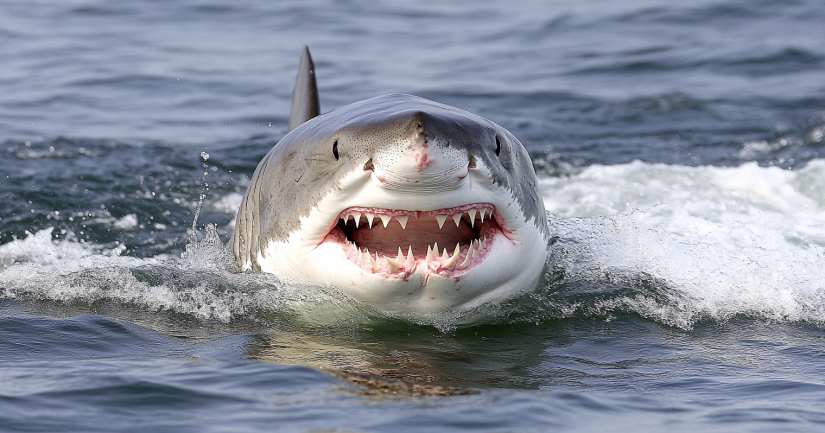
Great White Shark Quiz , Test Your Knowledge of the Ocean’s Most Iconic Predator! With their razor-sharp teeth, powerful torpedo-shaped bodies, and unmatched hunting skills, great white sharks are the ultimate apex predators of the ocean. Known for their fearsome reputation, incredible speed, and highly developed senses, these sharks have fascinated marine biologists, divers, and shark enthusiasts for decades. Whether they’re breaching out of the water to hunt seals or patrolling coastal waters, great whites are both feared and admired. But how much do you really know about these legendary creatures? Take our Great White Shark Quiz and put your marine knowledge to the test!
Great white sharks (Carcharodon carcharias) belong to the mackerel shark family, making them relatives of makos, porbeagles, and other fast-swimming sharks. Found in oceans worldwide, they are expert hunters, using a combination of speed, stealth, and powerful bites to dominate the marine food chain.
They Have Up to 300 Teeth at a Time – Great whites constantly shed and replace their teeth, ensuring they always have a sharp, deadly bite.
Ready for more adventures? Explore the intelligence of dolphins in our Dolphin Quiz or dive into the depths with the awe-inspiring Blue Whale Quiz.
Mind-Blowing Great White Shark Facts That Might Surprise You
- They Can Smell a Single Drop of Blood from Miles Away – Thanks to their highly sensitive olfactory system, great whites can detect the scent of injured prey from vast distances.
- They Are Among the Fastest Sharks in the Ocean – With a top speed of 25 mph (40 km/h), great whites use explosive bursts of speed to ambush prey.
- They Can Breach Out of the Water – In places like Seal Island, South Africa, great whites are known for launching themselves completely out of the water when attacking seals—a behavior called breaching.
- They Use Electrosensory Detection to Hunt – Great whites can detect the electric fields of living creatures using special receptors called ampullae of Lorenzini, allowing them to find hidden prey.
- They Can Grow Over 20 Feet Long – While the average great white is around 11-16 feet (3.3-4.9 meters), some individuals can reach lengths of over 20 feet (6 meters) and weigh more than 5,000 pounds (2,270 kg).
- They Have No Natural Predators (Except for One) – As the top predators of the ocean, adult great whites fear no other marine animal—except orcas, which have been known to hunt them.
- They Travel Thousands of Miles Across the Ocean – Great whites are highly migratory, swimming across entire oceans to find food, warmer waters, and breeding grounds.
- They Can Go Months Without Eating – After a big meal (such as a seal), great whites can survive for weeks or even months before needing to hunt again.
- They Are Not the “Man-Eaters” Movies Portray – Despite their reputation, attacks on humans are rare. Most great white bites are cases of mistaken identity, as sharks investigate their surroundings using their mouths.
The Role of Great White Sharks in Marine Ecosystems
Great white sharks are vital to ocean ecosystems, helping to keep prey populations healthy and balanced. As apex predators, they prevent overpopulation of certain marine species, ensuring biodiversity and ecological stability. However, climate change, habitat destruction, and illegal hunting pose serious threats to great white populations.
Despite their fearsome image, great whites are vulnerable to extinction due to overfishing, finning, and accidental bycatch. Conservation efforts focus on protecting shark populations, banning finning practices, and educating the public about the importance of these apex predators.
Are You Ready to Take the Ultimate Great White Shark Quiz?
If you love marine biology, shark conservation, or just the thrill of the deep sea, this Great White Shark Quiz is for you! Whether you’re fascinated by their incredible senses, migration patterns, or misunderstood reputation, this quiz will challenge your knowledge and reveal amazing facts about the ocean’s most famous predator.
So, are you ready to test your knowledge and dive into the world of great white sharks? Take the Great White Shark Quiz now and see if you’re a true shark expert! 🌊🦈
Love the ocean? Test your knowledge with the Guess the Sea Animal Quiz, discover your marine match in the What Sea Animal Am I Quiz, or explore more Marine Quizzes for underwater fun!
Great White Shark – FAQ
The Great White Shark, scientifically known as Carcharodon carcharias, is one of the largest predatory fish. It can be found in coastal waters of all major oceans, particularly in temperate and subtropical regions. They prefer areas where the water temperature ranges between 54°F and 75°F (12°C to 24°C).
Great White Sharks are carnivorous and primarily feed on marine mammals such as seals and sea lions. They also consume fish and, occasionally, carrion. Their diet can vary depending on their habitat and the availability of prey, showcasing their adaptability in hunting.
Great White Sharks employ a variety of hunting techniques. They often use a method known as “spy hopping,” where they elevate their heads above the water to survey their surroundings. They are known for their powerful ambush attacks, typically striking from below with incredible speed and force to catch their prey off guard.
While Great White Sharks are often portrayed as dangerous, attacks on humans are rare. Most encounters occur due to curiosity rather than aggression. It is important to remember that these sharks play a crucial role in marine ecosystems, and protecting them is vital for ocean health.
Conservation initiatives for Great White Sharks include legal protections in many countries, habitat preservation, and research programs aimed at understanding their behavior and populations. Organizations are also working to raise public awareness about the importance of these apex predators and the threats they face from overfishing and habitat loss.
